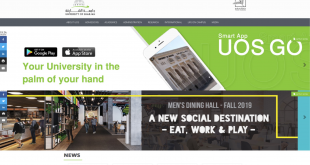Scroll down for Arabic abstract. The primary objective of this study is to identify the use of artificial intelligence (AI) as a mechanism for verification and detection of fake news in the Saudi Al Ekhbariya channel. The study also aims to know the vision of senior channel administration in terms …
Read More »The Interaction of University Youth with Fake News and its Circulation on Social Media (Arabic)
Scroll down for Arabic abstract. The current study is a descriptive study aimed at identifying the extent to which university youth interact with fake news published on social media as well as their role in circulating or limiting its publication. The study used media survey methodology and deployed a questionnaire …
Read More »Following the 2022 FIFA World Cup Qualifiers on Facebook: A comparative study between Arab and Non-Arab Audiences
Abstract Over the past decade, sports teams and federations have prioritized providing content on important digital platforms to circulate relevant news and coverage, particularly on social networking sites. These sites have increasingly become reliable news sources that audiences can follow and then share this content among themselves. With the Middle …
Read More »The Use of Twitter by Saudi Sports Clubs to Increase Fan Interaction (Arabic)
Scroll down for Arabic abstract. This study seeks to determine how Saudi sports clubs can use Twitter to increase fan participation and interaction. The forms of the provided content and its vitality were analyzed to determine whether there is a relationship between fans’ interaction and types of content and whether …
Read More »A Critical Content Analysis of Kuwaiti TV Shows and Plays on Disability Representations
Abstract There is a dearth of disability literature in the Arab world, especially studies related to the cultural representation of disabled people in the media. This article provides a historical overview of television and theatre in Kuwait, an exploration of different disability perspectives such as the individual and the social …
Read More »Debunking COVID-19 Fake News on Arabic Fact-Checking Websites: An Analytical Study (Arabic)
Scroll down for Arabic abstract. The COVID-19 pandemic has revealed an information crisis, labeled an “Infodemic”. This study explores the methodology of debunking fake news related to the pandemic on independent Arabic fact-checking websites. The study’s results are derived from a textual and visual analysis of the content related to …
Read More »Pragmatics in Egyptian and Chinese Journalistic Discourse on Covid-19 Global Health Diplomacy: A Comparative Study and Proposed Preventive Geopolitics Perspective (Arabic)
Scroll down for Arabic abstract. This article attempts to use pragmatics for the analysis of opinion material on Youm7 and China Arabic websites. A sample survey from the period between January 1 and December 31, 2020 on global health diplomacy against COVID-19 has been conducted. The findings indicate that both …
Read More »Analyzing Journalist Perceptions of Democracy and State Corruption: The Case of Iraq
Abstract The aim of this paper is to explore Iraqi journalists' perceptions of state corruption and democracy in order to deepen the understanding of the journalist’s role in democratic participation. Survey interviews were conducted ona sample of Iraqi journalists, using the theory of participatory democracy to design the instrument. The …
Read More »Cultural Identity Expressed Through Electronic Platforms of Higher Education Institutions: A Comparative Study (Arabic)
Scroll down for the Arabic abstract. There is substantial cultural diversity in many societies these days. Consequently, the need for cross-cultural institutions to build and present their ethical values and cultural identity within different systems and societies has grown. Most higher education institutions face the challenge of applying their own …
Read More »Organizational Identity in the Egyptian Telecom Sector: A Field Study (Arabic)
Scroll down for the Arabic abstract. This study attempts to identify and explore the process of organizational identity formation inside the Egyptian telecommunication sector using a field survey and a questionnaire answered by 200 employees at varying administrative levels. By identifying and exploring the process, phases, and characteristics of organizational …
Read More » Arab Media & Society The Arab Media Hub
Arab Media & Society The Arab Media Hub










